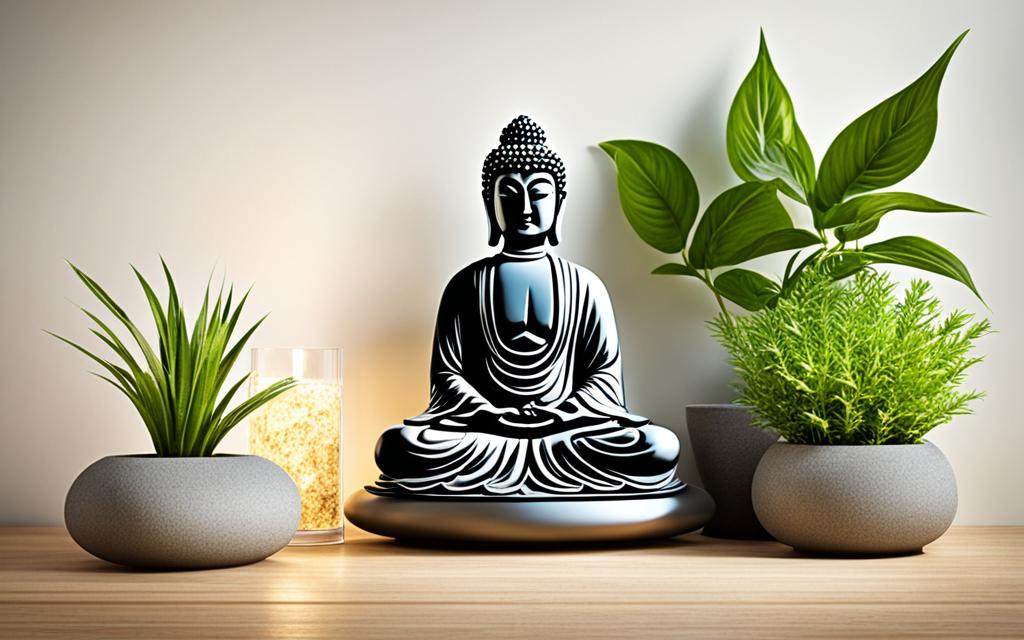In today’s fast-paced world, where stress management techniques have become a crucial aspect of overall well-being, the importance of creating a dedicated meditation space cannot be overstated. Research shows that stress is a major health concern, with 66% of American workers reporting that they lie awake at night troubled by the physical or emotional effects of it. Chronic stress is linked to numerous health problems, including obesity, heart disease, and mental health issues. By establishing a peaceful and distraction-free meditation space, individuals can cultivate mindfulness practices, reduce stress and anxiety, and improve their overall emotional well-being.
This article will explore the power of mindfulness, the importance of a dedicated meditation environment, and various coping strategies that can be practiced in this space. By understanding the impact of stress on our physical and mental well-being, and harnessing the transformative potential of mindfulness, individuals can embark on a journey towards enhanced work-life balance, time management skills, resilience building, and emotional intelligence.
Key Takeaways
- Creating a dedicated meditation space can provide significant benefits for stress management and overall well-being.
- Establishing a peaceful and distraction-free environment can help individuals cultivate mindfulness practices and reduce stress and anxiety.
- A dedicated meditation space can enhance work-life balance, time management skills, resilience building, and emotional intelligence.
- Integrating relaxation methods and coping strategies into this space can lead to improved emotional well-being and mental health support.
- Investing in a dedicated meditation space can be a transformative step towards self-care routines and workplace wellness.
Understanding Stress and Its Impact
Stress is a natural and unavoidable part of our lives, but understanding its nature and impact is crucial for effective stress management techniques and maintaining overall well-being. According to the National Institute of Mental Health, stress is the brain and body’s response to change, challenge, or demand. It is the body’s natural defense against danger brought on by an event or thought that makes you feel frustrated, angry, or nervous.
What Is Stress?
When a stressful event occurs, the body is flooded with hormones to avoid or confront danger. This is commonly referred to as the fight-or-flight response. This physiological reaction can be beneficial in the short term, as it helps us to respond quickly to potentially dangerous situations. However, stress can become a chronic condition if the proper steps to manage it are not taken.
Stress and the Body
Chronic stress can cause chemical changes in the body that may raise blood pressure, heart rate, and blood sugar levels. Long-term stress or high levels of stress may also lead to mental and physical health problems, such as anxiety, depression, and even heart disease. The impact of stress on the body can be far-reaching, making effective stress management a crucial aspect of maintaining overall well-being.
The Importance of Stress Management
Effective stress management techniques, relaxation methods, and coping strategies are essential for maintaining a healthy work-life balance, building resilience, and enhancing emotional intelligence. By developing a comprehensive approach to mental health support and anxiety reduction, individuals can foster a greater sense of emotional well-being and prevent the detrimental effects of chronic stress.
The Power of Mindfulness and Present-Moment Awareness
Research published in the Journal of Research in Personality reveals the profound impact of present-moment awareness, a core tenet of mindfulness practices, on building stress resilience and effective coping strategies. Present-moment awareness involves closely monitoring and attending to one’s current experience, rather than getting caught up in worrying about the future or dwelling on the past. Studies show that an individual’s natural disposition toward remaining grounded in the present moment is linked to a host of mental health benefits, including lower levels of perceived stress, anxiety and depression, improved mood, and a heightened sense of emotional well-being.
How Mindfulness Helps
Cultivating present-moment awareness through mindfulness practices can empower individuals to respond to stress with strategies that lead to greater health and well-being. By staying attuned to the present, they develop a greater perceived ability to handle stress and rely more on their core values to navigate challenging situations. This, in turn, can enhance emotional intelligence and foster a deeper sense of resilience building.
Cultivating Present-Moment Awareness
Engaging in regular mindfulness practices, such as focused breathing exercises, body scans, or guided meditations, can help individuals develop the habit of remaining anchored in the present moment. By repeatedly bringing their attention back to the here and now, practitioners can train their minds to stay grounded, even amidst the ups and downs of daily life. This heightened present-moment awareness empowers them to respond to stress and anxiety with greater mental health support and a strengthened sense of emotional well-being.

Creating a Dedicated Meditation Space
Establishing a dedicated meditation space can significantly enhance the benefits of mindfulness and stress reduction practices. When choosing the location for a meditation space, it is important to consider factors such as privacy, natural lighting, and minimal distractions.
Choosing the Right Location
The space should be quiet, free from external noise and visual stimuli, and provide a sense of calmness and serenity. By selecting a location that offers these qualities, you can create an environment that is conducive to focused relaxation, mindfulness practices, and emotional well-being.
Essential Elements for a Peaceful Environment
Essential elements for a peaceful meditation environment include comfortable seating, such as a cushion or chair, soft lighting, calming colors, and natural elements like plants or artwork. These thoughtful details can help you cultivate a consistent and rejuvenating meditation practice, which can lead to improved stress management, work-life balance, and overall well-being.
By creating a dedicated space that is tailored to your needs and preferences, you can foster a sense of resilience and emotional intelligence through regular mindfulness practices. This, in turn, can enhance your self-care routines and contribute to a more workplace wellness centered lifestyle.
Stress Management Techniques
Stress management involves a multifaceted approach, and practicing various techniques can significantly improve one’s ability to navigate stressful situations. From activating the parasympathetic nervous system through breathing exercises to cultivating self-compassion and emotional resilience, individuals can develop a comprehensive strategy to manage stress and enhance their overall well-being.
Breathing Exercises for Relaxation
Breathing exercises, such as deep breathing or breath counting, can activate the parasympathetic nervous system, reducing heart rate and blood pressure, and inducing a state of relaxation. By focusing on the rhythm and sensation of the breath, individuals can interrupt the body’s stress response and enter a more calming, grounded state of being.
Self-Compassion and Emotional Resilience
Cultivating self-compassion, which involves being mindful of your emotions, understanding that mistakes are part of being human, and speaking to yourself with kindness, can enhance emotional resilience and well-being. This practice can help individuals navigate stressful situations with greater self-understanding and the ability to bounce back from challenging experiences.
Fostering Genuine Connection
Maintaining genuine connections with others can also be a powerful stress management technique. By fostering a sense of belonging and social support, individuals can feel less isolated and more empowered to face life’s stressors. Engaging in meaningful conversations, sharing experiences, and building strong relationships can contribute to overall well-being and a greater sense of emotional stability.
Practicing Compassion for Others
In addition to self-compassion, practicing compassion for others can also be a valuable stress management tool. By cultivating a sense of empathy and concern for the well-being of others, individuals can shift their focus away from their own problems and contribute to a more positive and supportive environment. This practice can help reduce feelings of isolation and promote a greater sense of interconnectedness, which can enhance emotional well-being and resilience.
By incorporating these stress management techniques into a daily routine, individuals can develop a comprehensive approach to managing stress and improving their mental and emotional health.

The Benefits of Meditation for Stress Reduction
Numerous studies have demonstrated the benefits of meditation for stress reduction and overall emotional well-being. Meditation can help reduce stress and anxiety by activating the relaxation response, which decreases the production of stress hormones like cortisol. This, in turn, can lead to lower blood pressure, improved mood, and a greater sense of emotional stability.
Reducing Stress and Anxiety
By cultivating present-moment awareness and a non-judgmental attitude towards thoughts and feelings, individuals can develop a deeper understanding of themselves and better manage difficult emotions. Additionally, meditation has been shown to increase gray matter in brain regions associated with emotional regulation, further contributing to improved mental health and resilience in the face of stress.
Improving Emotional Well-Being
Meditation also promotes emotional well-being by enhancing self-awareness and the ability to regulate emotions. This can lead to a greater sense of emotional stability and an overall improvement in mental health support and anxiety reduction.
Enhancing Self-Awareness
By cultivating a deeper connection with the present moment and a non-judgmental attitude towards one’s inner experiences, meditation can enhance self-awareness and foster a better understanding of one’s thoughts, emotions, and behaviors. This, in turn, can contribute to improved emotional intelligence and more effective coping strategies for managing stress and anxiety.
Getting Started with Meditation and Mindfulness
For those new to meditation and mindfulness, getting started can feel overwhelming. However, there are accessible and beginner-friendly practices that can help individuals ease into these transformative practices.
Beginner-Friendly Yoga and Meditation Practices
Gentle yoga poses, focused breathing exercises, and guided meditations can be great entry points for individuals looking to incorporate relaxation methods and mindfulness practices into their daily lives. These coping strategies can help cultivate a sense of work-life balance and resilience building.
Creating a Dedicated Space for Practice
Establishing a dedicated space for meditation and mindfulness practice, whether it’s a quiet corner in your home or a serene outdoor area, can also enhance the experience and make it easier to develop a consistent routine. This can be particularly beneficial for time management skills and workplace wellness, as it allows individuals to carve out time for self-care routines and emotional well-being.
Developing Patience and Self-Compassion
Importantly, it is essential to approach the practice with patience and self-compassion, as the journey towards greater mindfulness and stress reduction may involve ups and downs. By cultivating these qualities, beginners can navigate the process with kindness and embrace the gradual progress they make over time, ultimately enhancing their emotional intelligence and resilience.

Incorporating Yoga and Meditation into Daily Life
To truly unlock the benefits of yoga and meditation for stress management, it is essential to integrate these practices into one’s daily routine. Establishing a regular practice time, whether it’s in the morning, during a lunch break, or in the evening, can help reinforce the habit and make it a consistent part of one’s self-care routine.
Establishing a Regular Practice Routine
By setting aside a dedicated time for mindfulness practices each day, even if it’s just for a few minutes, individuals can gradually develop a routine that becomes an integral part of their work-life balance and time management skills. This consistent practice can lead to improved resilience building and enhanced emotional intelligence, as the mind and body become accustomed to the calming effects of these activities.
Being Flexible and Adaptable
At the same time, it’s important to be flexible and adaptable, as life can be unpredictable. On days when it’s challenging to find dedicated time for a longer practice, individuals can break their practice into shorter sessions or find opportunities to incorporate mindfulness and breath awareness into their daily activities, such as during a walk or while completing household chores. By maintaining this balanced approach, individuals can cultivate a sustainable yoga and meditation practice that provides consistent stress-relieving benefits and supports their overall emotional well-being and workplace wellness.
The Science Behind Mindfulness and Meditation
Modern scientific research has revealed the measurable benefits of mindfulness and meditation, providing a deeper understanding of the mechanisms behind their effectiveness in reducing stress and improving overall well-being. Studies have shown that mindfulness and meditation practices can decrease the production of stress hormones, such as cortisol, which are linked to numerous health problems.
Reducing Stress Hormones
These practices also promote emotional regulation by strengthening brain regions associated with emotional processing and self-awareness. This enhanced emotional regulation can lead to improved stress management and a greater sense of mental and emotional well-being.
Promoting Emotional Regulation
Additionally, mindfulness and meditation have been found to enhance sleep quality, as the relaxation and present-moment focus they cultivate can help individuals fall asleep more easily and enjoy more restful sleep. The growing body of scientific evidence highlights the powerful impact these ancient practices can have on stress management, emotional well-being, and overall mental health.
Enhancing Sleep Quality
By understanding the scientific underpinnings of mindfulness and meditation, individuals can gain a deeper appreciation for the transformative potential of these practices in their journey towards resilience building, emotional intelligence, and sustained emotional well-being.
Mindfulness and Meditation for Mental Health
Mindfulness and meditation can be particularly beneficial for individuals struggling with mental health challenges, such as anxiety and depression. These practices provide a way to cultivate present-moment awareness and a non-judgmental attitude towards thoughts and emotions, which can help manage the symptoms of these conditions.
Managing Anxiety and Depression
By learning to observe their inner experiences without getting caught up in negative thought spirals, individuals can develop greater emotional regulation and the ability to respond to difficult emotions with compassion rather than avoidance or resistance. This can be especially helpful for those dealing with anxiety and depression, as it allows them to break free from the cycle of rumination and find more effective coping strategies.
Cultivating Resilience and Well-Being
Additionally, regular mindfulness and meditation practice has been shown to increase resilience, reduce stress, and enhance overall well-being. By incorporating these techniques into their daily lives, individuals can transform their relationship with their inner experiences and improve their mental health. Through increased self-awareness, emotional intelligence, and the development of stress management techniques, mindfulness and meditation can be powerful tools in the journey towards greater mental health support and emotional well-being.

Integrating Mindfulness into Daily Activities
Mindfulness is not limited to dedicated meditation practice; it can be integrated into various aspects of daily life to enhance stress management and overall well-being. Mindful eating, for example, involves being fully present and attentive to the sensations, flavors, and textures of food, which can help individuals develop a more conscious relationship with their eating habits and promote better digestion and nutrient absorption.
Mindful Communication
Mindful communication, where one actively listens and responds with presence and empathy, can strengthen interpersonal connections and reduce misunderstandings. By cultivating mindful practices in our daily interactions, we can foster deeper, more meaningful relationships and navigate potential conflicts with increased emotional intelligence and resilience building.
Mindful Movement
Mindful movement, such as practicing mindful walking or incorporating mindfulness into physical activities like yoga or tai chi, can help individuals stay grounded and attuned to their bodies, promoting physical and mental relaxation. By integrating mindfulness practices into our daily routines, we can cultivate a more mindful and balanced lifestyle, which can lead to improved stress management and overall well-being.
Through the seamless integration of mindfulness practices into our daily lives, we can unlock the transformative power of present-moment awareness and self-care routines to enhance our overall emotional well-being and navigate the challenges of modern life with greater resilience and coping strategies.
Building a Sustainable Practice
Establishing a sustainable meditation and mindfulness practice requires a combination of motivation, consistency, and self-compassion. Finding the right motivation, whether it’s improving stress management, enhancing emotional well-being, or cultivating a deeper self-awareness, can help individuals stay committed to their practice.
Finding Motivation and Consistency
Consistency is key, as building a habit takes time and patience. By setting aside a dedicated time for mindfulness practices each day, even if it’s just for a few minutes, individuals can gradually develop a routine that becomes an integral part of their self-care routines. Incorporating time management skills and finding creative ways to integrate relaxation methods into their daily lives can further support the development of a sustainable practice.
Celebrating Progress and Milestones
Importantly, it’s essential to celebrate progress and milestones, no matter how small, and to approach the journey with kindness and understanding. Setbacks or periods of inconsistency are natural, and by meeting them with self-compassion, individuals can maintain the motivation and resilience needed to sustain a transformative meditation and mindfulness practice. Recognizing and acknowledging coping strategies that work, as well as the emotional intelligence gained along the way, can further strengthen one’s commitment to this work-life balance enhancing endeavor.
Conclusion
In today’s fast-paced world, where stress has become an unavoidable part of our daily lives, the benefits of a dedicated meditation space for stress management cannot be overstated. By understanding the impact of stress on our physical and mental well-being, and harnessing the power of mindfulness and present-moment awareness, we can cultivate a profound sense of inner peace and emotional resilience.
Creating a serene meditation environment, equipped with essential elements for relaxation, and incorporating a variety of stress management techniques, such as breathing exercises, self-compassion, and compassion for others, can lead to a transformative journey towards improved stress reduction and overall well-being. The science behind mindfulness and meditation further reinforces the tangible benefits these practices can have on reducing stress hormones, promoting emotional regulation, and enhancing sleep quality.
As we integrate these ancient practices into our daily lives, we can unlock the path to sustainable stress management, mental health support, and a renewed sense of emotional well-being. By prioritizing our self-care routines and work-life balance, we can cultivate the time management skills and emotional intelligence needed to navigate the challenges of modern life with greater resilience and well-being.
FAQ
What are the benefits of a dedicated meditation space for stress management?
How does stress impact the body and overall health?
How can mindfulness and present-moment awareness help with stress management?
What are the essential elements for creating a peaceful meditation environment?
What are some effective stress management techniques to practice in a dedicated meditation space?
How can meditation help reduce stress and improve emotional well-being?
What are some beginner-friendly practices to get started with meditation and mindfulness?
How can I integrate yoga and meditation into my daily routine for long-term benefits?
What are the scientific benefits of mindfulness and meditation for stress reduction and mental health?
How can mindfulness and meditation help with mental health challenges like anxiety and depression?
How can I integrate mindfulness into my daily life beyond dedicated practice?
What are the keys to building a sustainable meditation and mindfulness practice?
Source Links
- https://www.mindful.org/how-to-manage-stress-with-mindfulness-and-meditation/
- https://peakbehavioral.com/the-power-of-mindfulness-and-meditation-for-mental-health/
- https://mississippidatc.com/the-advantages-of-using-yoga-and-meditation-for-stress-management-and-emotional-balance/

